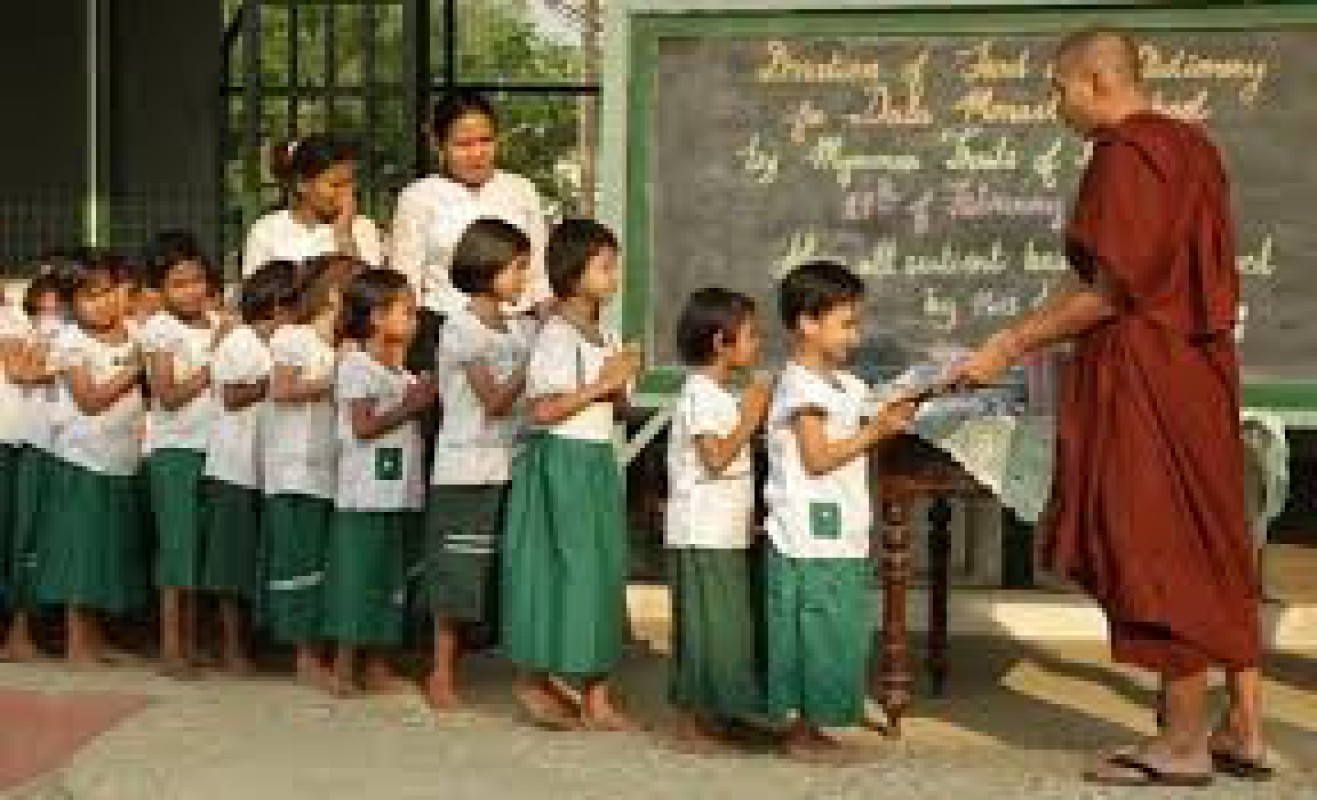Monastic Education in Myanmar: Preserving Heritage, Empowering the Future

638

Hsu (NP News) - July 4
In the early morning light, the rhythmic chants of young novices echo through the tranquil compounds of monasteries across Myanmar. These sacred spaces are not only spiritual sanctuaries but also vital centers of learning, providing free education to hundreds of thousands of children, especially in rural areas where government schools are scarce. Monastic education has been a cornerstone of Myanmar’s sociocultural fabric for centuries, blending religious instruction with secular knowledge to sustain both tradition and progress. Often seen as the spiritual backbone of Burmese society, these schools do far more than teach religious doctrine. They stand as critical institutions that fill educational gaps, preserve cultural heritage, and uplift underprivileged communities. For international observers seeking to understand the heart of Myanmar, the story of monastic education offers a compelling glimpse into the resilience and compassion of its people.
A Deep-Rooted Legacy
Monastic education in Myanmar dates back over a thousand years, tracing its origins to the introduction of Theravāda Buddhism in the region. Historically, monasteries (locally known as Phone Gyee kyaung) were the primary centers of learning, long before the advent of colonial or modern state-run schools. Monks played the dual roles of spiritual leaders and teachers, providing instruction in Pāli scriptures, ethics, literacy, and numeracy. This system was not only inclusive—open to all boys regardless of class—but also deeply intertwined with daily life and moral upbringing.
During the Konbaung Dynasty (1752–1885), monastic schools were instrumental in fostering a high literacy rate, particularly among males. British colonial records even noted that literacy in Burma was higher than in many parts of the British Empire. Despite changes in governance and the evolution of public education systems, monastic schools have maintained their relevance, especially in rural areas.
A Lifeline for Rural and Marginalized Communities
In contemporary Myanmar, where many rural and impoverished areas still struggle with inadequate infrastructure and limited access to government schools, monastic schools play a vital role. Often supported by donations and volunteer teachers, these schools provide free education, food, and sometimes even lodging to children who might otherwise remain illiterate.
For families who cannot afford school uniforms, textbooks, or transportation costs, monastic schools are not just an option—they are the only hope. They offer basic education from primary to middle school level, with some even extending to high school or vocational training. These schools often operate with limited resources, yet their commitment to inclusive education is unwavering.
According to UNICEF and local NGOs, monastic education serves over 300,000 children across Myanmar. Many of these students come from ethnic minority backgrounds or internally displaced communities, highlighting the schools’ crucial role in promoting social inclusion and cohesion in a multi-ethnic nation.
Preserving Culture, Instilling Values
Beyond academic instruction, monastic schools play a key role in instilling cultural identity and moral values. In an increasingly globalized world, where materialism and rapid change challenge traditional norms, these schools offer grounding in Buddhist principles—compassion, mindfulness, and community service.
The curriculum often integrates traditional arts such as poetry, palm-leaf manuscript reading, chanting, and classical Burmese music. In doing so, they act as custodians of Myanmar's intangible cultural heritage, fostering a sense of pride and identity among young learners.
"Many families here cannot afford to send their children to state schools," says Sayadaw U Nyanissara, a senior monk overseeing a monastic school in Shan State. "We take them in, provide food, shelter, and education, so they have a chance for a better future."
These schools follow a hybrid curriculum, combining Myanmar’s state syllabus with Buddhist teachings. Students learn mathematics, science, and English alongside moral education, meditation, and scripture—a blend that fosters both intellectual and ethical development.
Moreover, monastic education offers spiritual sanctuary and stability, especially in times of political unrest or conflict. During such periods, monasteries become safe havens not only for learning but also for emotional and social support.
Success Stories Rooted in Humility
Though humble in appearance, many monastic schools have produced remarkable success stories. Former students of monastic education have gone on to become teachers, community leaders, doctors, and even members of Parliament. Some schools have partnered with NGOs and international donors to enhance teaching standards, introduce modern pedagogical methods, and expand access to technology.
One notable example is the Phaung Daw Oo Monastic School in Mandalay, which offers both secular and monastic education to over 7,000 students. With support from local and international donors, the school has introduced inclusive education for children with disabilities, computer training, and even teacher training programs. Its success demonstrates how monastic education can evolve while staying true to its core values.
An Invitation to the World
For international travelers, scholars, and donors, monastic education in Myanmar offers a unique opportunity to witness the intersection of tradition and progress. Visiting a monastic school means stepping into a world where simplicity meets depth, where young children chant Buddhist verses in the morning and study science in the afternoon, and where learning is rooted in community compassion.
Organizations and individuals who wish to support educational development in Myanmar would find monastic schools a meaningful point of engagement. Support could range from providing school supplies to sponsoring teacher training or even facilitating cultural exchange programs.
Conclusion
In the heart of Myanmar’s monastic schools lies a powerful message: education is not merely a tool for economic advancement—it is a path to ethical living, social harmony, and national resilience. As Myanmar continues to navigate complex political and economic challenges, monastic education stands as a testament to the enduring strength of its people and culture.
For the international community, understanding and supporting these schools is more than an act of charity—it is a partnership in preserving a legacy that continues to nurture the soul of a nation.